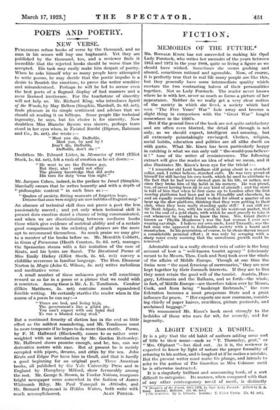POETS AND POETRY.
NEW VERSE.
PUBLISHERS refuse books of verse by the thousand, and no man in his senses will buy one haphazard. Yet they are
published by the thousand, too, and a reviewer finds it incredible that the rejected books should be worse than the accepted. His task may easily make him despair of poetry. When he asks himself why so many people have attempted to write poems, he may decide that the poetic impulse is a desire to flourish the emotions, to prove the writer sensitive and misunderstood. Perhaps he will be led to accuse even
the best poets of a flagrant display of bad manners and a mere licehsed irreticence. For the touchstone of sincerity will not help us. Mr. Richard King, who introduces Spirit of the Woods, by May Belben (Simpkin, Marshall, 2s. 6d. net),
finds pleasure in its simple sentiment and advises that we should sit reading it on hilltops. Some people like technical ingenuity, he says, but his choice is for sincerity. Now
doubtless Miss Blanche Byrom was sincere, perhaps tears stood in her eyes when, in Twisted Scarlet (Diprose, Bateman
and Co., 3s. net), she wrote :- " Must you die, Daffodils, Must you, by and by Don't die, Daffodils, Daffodils, don't die ! "
Doubtless Mr. Edward Lister, in Memories of 1915 (Elliot
Stock, ls. Gd. net), felt a rush of emotion as he set down ,
" He went to see the Pictures gay, But they, alas ! could not allay The gloomy knowledge that did smite His turn for duty 'twas this night."
Mr. Jacques Cohen, indeed, in the preface to Israel (Simpkin, Marshall) swears that he writes honestly and with a depth of
" philosophic content " in such lines as :— " Qualms of anxiety, flitting moments of forgotten hope, Dreams that once were mighty are now bubbles of fragrant soap."
An absence of technical skill does not prove a poet the less passionately moved ; and yet only when technical skill is present does emotion stand a chance of being communicated, and when we are discriminating between mediocre books those which give evidence of metrical ability and of a certain good comportment in the ordering of phrases are the more apt to recommend themselves. So much praise we may give to a number of the books before us. Mr. Meredith Cobbett,
in Grass of Parnassus (Heath Cranton, 3s. Gd. net), manages the Spenserian stanza with a fair imitation of the ease of Keats, and his lyrics are fluent. The Devotional Poems of
Miss Emily Hickey (Elliot Stock, 2s. 6d. net) convey a childlike reverence in familiar language. The Hon. Eleanour
Norton in Magic (John G. Wilson, 5s. net) writes melodious
and meditative verse.
A small number of these unknown poets will sometimes
reward us so far in a poem or a phrase that we could wish it rewritten. Among these is Mr. A. E. Tomlinson. Candour
(Elkin Matthews, 5s._ net) contains much squandered forcible writing. He certainly startles the reader when in the course of a poem he can say
" Times are bad, and living high, The government's like a giblet pie. You can't expect with one haini dud To run a blasted racing stud."
But a continued ferocity of diction has in the end as little
effect as the mildest maundering, and Mr. Tomlinson must be more temperate if he hopes to do more than startle. Poems, by F. M. Hallward (Blackwell), comes to us rather over-
weighted with an introduction by Mr. Gordon Bottomley. Mr. Hallward shows promise enough, and he, too, can use derivative metres with ease. But at present he is mainly
occupied with pipers, dreams, and cities by the sea. John Keats and Edgar Poe have him in thrall, and that is hardly a good beginning for an original poet. Three American
books, all published by the Yale University Press and in England by Humphrey Milford, show favourably among
the rest. Mr. George S. Brown, in Yankee Notions, composes bright newspaper verse somewhat in the fashion of James Whitcomb Riley. Mr. Paul Tanaquil in Attitudes, and Mr. Bernard Raymond in Hidden Waters, both write with










































 Previous page
Previous page